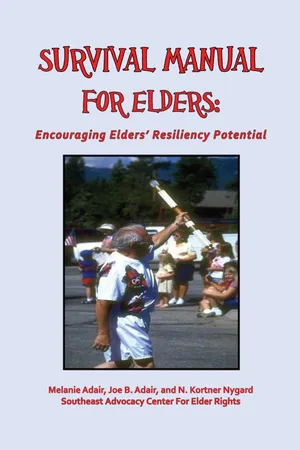
eBook - ePub
Survival Manual for Elders: Encouraging Elders' Resiliency Potential
This is a test
- 80 pages
- English
- ePUB (mobile friendly)
- Available on iOS & Android
eBook - ePub
Survival Manual for Elders: Encouraging Elders' Resiliency Potential
Book details
Book preview
Table of contents
Citations
About This Book
Helps seniors and their caregivers successfully navigate the challenges of aging, make informed decisions, and focus on individualized goals of care to promote resiliency and maximum functional potential. A team of physicians, nurses, social workers, psychologists, therapists, chaplains, business and legal experts collaborate on topics such as dignity, health promotion, care choices, common symptoms, medication safety, cognitive and mental health concerns, illness complications, rehabilitation, and recuperation. Discussions of legal advance directives and healthcare finances are particularly helpful in clarifying the maze of choices facing seniors and their caregivers as they negotiate our US industrial, financial, and healthcare complex.
Frequently asked questions
At the moment all of our mobile-responsive ePub books are available to download via the app. Most of our PDFs are also available to download and we're working on making the final remaining ones downloadable now. Learn more here.
Both plans give you full access to the library and all of Perlego’s features. The only differences are the price and subscription period: With the annual plan you’ll save around 30% compared to 12 months on the monthly plan.
We are an online textbook subscription service, where you can get access to an entire online library for less than the price of a single book per month. With over 1 million books across 1000+ topics, we’ve got you covered! Learn more here.
Look out for the read-aloud symbol on your next book to see if you can listen to it. The read-aloud tool reads text aloud for you, highlighting the text as it is being read. You can pause it, speed it up and slow it down. Learn more here.
Yes, you can access Survival Manual for Elders: Encouraging Elders' Resiliency Potential by Melanie J.D. Adair, Joe B. Adair in PDF and/or ePUB format, as well as other popular books in Medicine & Health Care Delivery. We have over one million books available in our catalogue for you to explore.
Information
Publisher
eBookIt.comISBN
9781935186328
Topic
MedicineSubtopic
Health Care DeliveryCOGNITIVE IMPAIRMENTS AND MEMORY LOSS
Cognitive Problems Caused By Prescription Drugs
It is amazing how many older people end up in nursing homes, dementia units or require significant extra help because of the medications they are taking. Problems may result from the wrong drug or dose for them; drugs that interact with each other; or getting the dosage mixed up. Many people with a diagnosis of “dementia” can have most of the symptoms disappear when they get off of their cognitive impairing medications. It is extremely rare that a medication is so critical to a person’s life that it is worth causing serious impairments in thinking and memory.
Tom was 86 years old and presented as being totally confused and uncertain of his surroundings. His physician labeled him as likely having Alzheimer’s disease and needing a nursing home. When the family protested that this was not true, the doctor suggested that if they were not going to follow his advice to go to a nursing home, they should just call in hospice. Fortunately, that family consulted a second physician who took Tom off of the high doses of medication for his neuropathy and pain. Tom improved dramatically and was able to return to his home and live on his own. What’s more, his medical condition, including his pain, actually improved by simply taking the over-the-counter medications that his new physician prescribed.
Usually, there is an alternative treatment to many medications that can eliminate serious complicating side-effects. Too often physicians do not look closely enough at the side-effects that prescription medications may be having on older patients. Physicians and nurses have been found by researchers to have the same Ageist attitudes and misinformation as the general public. Consequently, they assume cognitive impairment must be a symptom of dementia, instead of first looking carefully at the elder’s medication. Therefore, it is vital to become familiar with the medications often prescribed for older adults that can cause dementia-like symptoms. If the medical system were more committed to elder resiliency, it is likely that medications would be evaluated much more closely and carefully.
Some of the common medications that cause problems in elders include a class of drugs known as Anticholinergics, which block the neurotransmitter Acetylcholine. Common medications in this class are both prescription and over-the-counter drugs. They are used to treat allergies, to help a person sleep and for over-active bladders. Some of the more popular ones include:
Anticholinergics
Benadryl
Demerol
Detrol
Dramamine
Elavil
Enablex
Excedrin
Nytol
Paxil
Sominex
Tylenol PM
Unisom
Vesicare
Another class of drugs with serious cognitive side-effects is known as benzodiazepines – medications that suppress the functioning of the central nervous system. They have been found in numerous studies to cause dizziness and unsteady gait, memory problems, anxiety, insomnia, musculoskeletal problems, drowsiness, disorientation, swallowing disorders, speech distortion, poor concentration, incontinence, diarrhea and excessive saliva. They are prescribed as sleeping pills, tranquilizers, and muscle relaxants. These drugs are particularly likely to change from being tolerated to not being tolerated as a person’s liver ages and slows. A dose that was useful at age 40 may become toxic by age 70. One common problem is that an elder develops dizziness and falls due to lingering effects of yesterday’s and today’s doses. Some of the more common drugs in this category with serious side-effects include:
Benzodiazepines
Ambien
Ativan
Bromazepam
Dalmane
Doral
Dormonoct
Halcion/Triazolam
Klonopin
Lexotan
Librium
Lorazepam
Lunesta
Mogadon/Nitrazepam
Prosom/Estazolam
Restoril/Temazepam
Rohypnol/Flunitrazepam
Serax/Oxazepam
Tranxene
Unisom
Valium
Vesicare
Versed/Midazolam
Xanax

Opiates are commonly used for pain management but can cause serious cognitive problems in older adults. Typical side-effects include: drowsiness, constipation, confusion, delirium, nausea, muscle twitching and shortness of breath.
Opiates include the following drugs:
Opiates
Demerol
Fentanyl (Duragesic,Fentora,Actigal)
Hydrocodone
Lorcet
Lorcet Plus
Lortab
Norco
Oxycodone
Oxycontin 40.
Percocet
Percodan
RMS MS Contin (Morphine)
Vicodin
Vicodin ES
Vicodin
Other drugs such as Gabapentin, used for nerve damage , when used in a high dosage, or along with other cognitive impairing drugs, can result in confusion and memory loss. Over the counter sleep aids like Tylenol P.M. also can cause serious cognitive impairment.
Cox 2 Inhibitors, such as Cerebrex and Tramadol, used for Arthritis or similar problems, can cause nausea, dizziness, headache, drowsiness and constipation – all with cognitive effects.
Various medications intended to lower blood pressure can also become problematic as a person’s body chemistry changes. Many times these drugs need to be given ONLY after a blood pressure check for that day indicates that the medication is needed. If the blood pressure is normal or low, it is withheld. Low blood pressure can cause dizziness, falls and cognitive impairment.
If a person is having cognitive problems, such as memory loss and confusion, or even hallucinations and delirium, it may be necessary to aggressively reduce or even eliminate any medication that might be contributing to the problem. Just because a dosage has been appropriate in the past, does not mean that it will continue to be. Work with your medical care provider to do this appropriately, as often drugs have to be reduced gradually. Don’t accept on face value the idea that studies of the drug show these side-effects to be rare. These studies are often performed by those who stand to profit through sales and use of the drug.
Drug research is almost never done on older people. It is done on young adults who are taking no other medications. Multiple issues in older body chemistry cause medications to affect seniors very differently than young adults, especially if they are also taking other cognitive impairing drugs.

“Drug Cascade” is a serious problem in elders. Gordon Schiff, M.D. of the Harvard Medical School describes this as what happens when a drug a patient is taking has a side effect. The person then seeks medical help for that new symptom (which is actually a side-effect of the first drug). The physician does not identify the problem as a side-effect and instead prescribes a drug for what appears to be a new problem. That drug also has side-effects. And then the problem cascades, continuing to grow, but it is so imbedded in all the medications being taken, that it becomes very hard to find the actual cause and effect. At times the extreme side-effects can be easily spotted, but the more subtle ones too often are not identified as caused by a prescription drug. An example is Sally, who came to a nursing home’s rehab department following a hip fracture. She had been anxious for years, and was found to be taking Valium (a benzodiazepine) and antivert (an anti-vertigo medicine). It is very possible that these drugs played a significant role in the fall that resulted in Sally’s broken hip.
The American Medical Association strongly suggests that anyone taking more than five medications is likely taking medications...
Table of contents
- eBook Cover
- Title Page
- INTRODUCTION
- AN OVERVIEW
- STAYING AS INDEPENDENT AS POSSIBLE
- COGNITIVE IMPAIRMENTS AND MEMORY LOSS
- HOSPITAL CARE – WHAT YOU NEED TO KNOW
- PALLIATIVE CARE
- ADVANCED DIRECTIVES
- REHABILITATION
- MEDICARE AND OTHER INSURANCE
- SENIOR LIVING SETTINGS
- CONCLUSION: Selected References:
- ABOUT SACFER